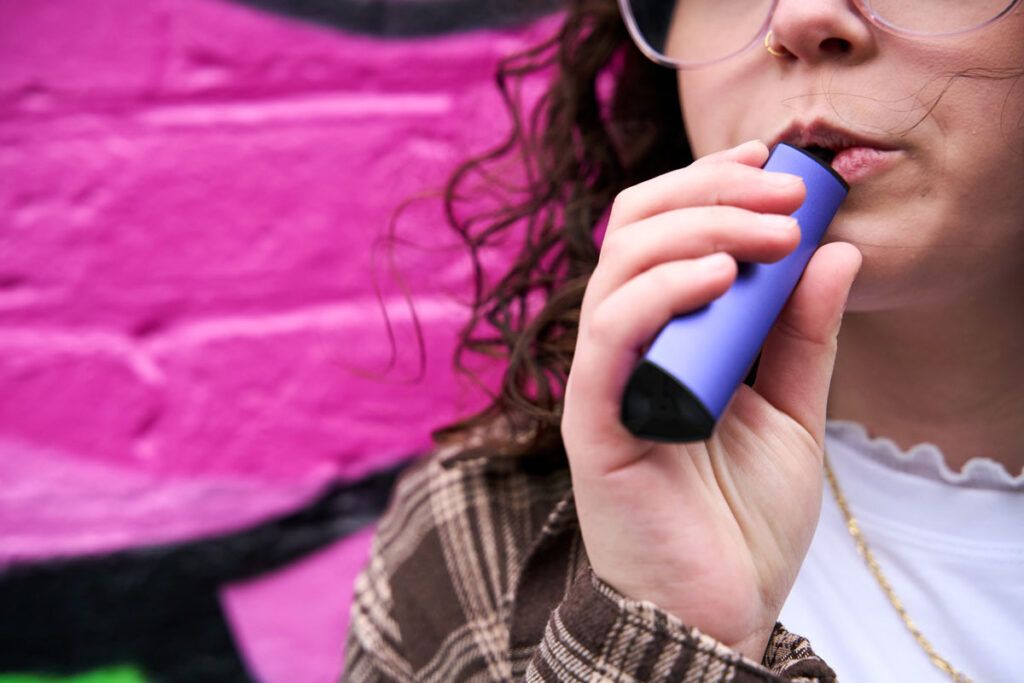Vaping doesn’t directly cause chronic obstructive pulmonary disease (COPD), but a strong link may exist between them.
COPD is a term that refers to several different health conditions that affect lung function and cause breathing difficulties and damage to the lungs. The most common types of COPD are chronic bronchitis and emphysema.
Smoking is a known cause of COPD, but vaping may also have a connection to COPD. Vaping consists of inhaling the vapor that electronic cigarettes produce. This vapor contains nicotine.
While vaping does affect your lungs and overall health, there isn’t enough research to conclude that it directly leads to COPD.
Vaping and COPD

Cigarette smoking is the leading cause of COPD. In fact, tobacco smoking is the cause of COPD in about 70% of people with the condition who live in high income countries like the United States.
Vaping has been viewed as a less harmful alternative to cigarette smoking. But research has increasingly shown the risks and damage to your health from vaping.
A 2019 study found that e-cigarettes cause as much inflammation and lung damage as cigarette smoke. In people with COPD, vaping can speed up the progression of the disease, according to the study.
In fact, people who vape and use e-cigarettes have a 75% higher risk of developing COPD than people who don’t smoke or vape, according to a 2020 study. The risk is even higher among people who both smoke and vape, according to a 2021 study.
Though vaping doesn’t produce the heavy smoke of conventional cigarettes or have the thousands of chemicals they contain, e-cigarettes do contain toxic chemicals that harm the lungs.
A 2019 study pointed out that participants who vaped had higher levels of protease enzymes, which can lead to emphysema. E-cigarettes also contain the chemical vitamin E acetate, which is linked to lung injury.
Is it better than smoking?
Vaping may be less harmful than cigarette smoking, but this doesn’t mean it’s safe. E-cigarettes have fewer chemicals than cigarettes and have been used as an alternative to conventional cigarettes, even as a way to help someone quit smoking.
When burned, cigarettes produce more than 7,000 chemicals, many of which can cause cancer. E-cigarettes, in turn, have anywhere from 60 to over 100 chemicals.
According to the Centers for Disease Control and Prevention (CDC), nearly 3,000 cases of lung injury resulted from vaping, and 68 deaths were caused by e-cigarette or lung injury associated with vaping, as of 2020.
Experts also advise against using vaping to help you quit smoking because e-cigarettes have the same ability to cause inflammation and lung damage as cigarette smoke.
Quitting vaping
As with quitting smoking, stopping the use of e-cigarettes and vaping is a process that may vary from person to person. But certain steps and practices can help make vaping cessation manageable and sustainable.
The American Lung Association recommends first talking with a healthcare professional who can help you develop a plan to quit vaping. The organization also recommends:
- knowing the reason you want to quit vaping, such as bettering your health and quality of life
- learning how to manage your stress and stressors
- knowing that you’re not alone and that you can lean on healthcare professionals, support groups, and loved ones
- learning what to expect from the process and knowing that you may have ups and downs, physically and emotionally
- taking medications when your healthcare professional recommends them, such as varenicline (Chantix), bupropion (Zyban), and nicotine patches, gum, lozenges, inhalers, or nasal sprays
- considering talking with a therapist, who can help you manage the underlying causes of stress that make you turn to vaping or smoking for relief
If you need help covering the cost of medications, the free Optum Perks Discount Card could help you save up to 80% on prescription drugs. Follow the links on drug names for savings on that medication, or search for a specific drug here.
